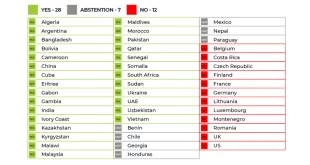 In late March this year, a Muslim third-grader was found hanging unconscious in his school in Louisville, KY. It was not the first time Muhammad had been bullied and abused.
In late March this year, a Muslim third-grader was found hanging unconscious in his school in Louisville, KY. It was not the first time Muhammad had been bullied and abused.
The same week a Muslim girl from Dreyfus School in New York was beaten up; thrown on the ground, had her headscarf pulled off, as she was repeatedly called a “terrorist,” “Muslim,” and a “bitch”. She was threatened to be stabbed with a knife unless she handed over her cell phone and all of her money. The victim suffered minor bruises and a cut lip. This was not the first time she was assaulted for being a Muslim.
We wish that these hate crimes were isolated cases. But according to a Columbia University study, seven percent of Muslim students in New York report being assaulted. There are 100,000 Muslim students in New York public schools which means about 7,000 Muslim students have been harassed in some way. Most of these daily crimes against Muslims go unreported, as most Muslims don’t trust police and the FBI enough to report them, especially considering that the FBI has knocked on the doors of 700,000 Muslim homes.
Islamophobia is affecting Muslim children in a serious manner. Statistics unfortunately don’t provide the life-impacting, human face of the issue. An NPR story from the This American Life program titled, Shouting Across the Divide was one of the rare reports like that, showing how a family was devastated after what happened to their daughter in school.
Islamophobia has a serious effect on the well-being of Muslims in America. Here are some others:
If Islamophobia continues, the following projected scenarios might also prove accurate:
In consideration of a well-established frustration-aggression nexus in the literature of violence, it is likely that some young Muslim Americans, God forbid, might resort to terrorism, hurting themselves and their neighbors, and fueling Islamophobia.
This is a serious issue. Muslim schools, and Islamic organizations need to think, plan, and assist young Muslims so they can handle Islamophobia in a better way and thrive despite it.
Unless we know the challenges we are facing, we cannot possibly plan to meet them. One of the major difficulties is that students, parents, teachers, and the Muslim leadership, are by and large, neither aware of the full magnitude of Islamophobia the Muslim community is facing, nor are they actually using the term Islamophobia. It is therefore of utmost importance that the community media (e.g. magazines, journals, newsletters, and Friday Khutabas) address this issue thoroughly, generate discussion on these topics, and share experiences and success stories among all stakeholders.
Parents must spare time to relate to their children now more than ever. It is only when we have a relationship that children value that they will they open up to us. We should adopt a family Shura or weekly family circle to relate to each other in a formal way as well. In family readings and weekend schools we need to emphasize themes like Tawakkul, Sabr, Adl, and Qist (trust, endurance, patience, fairness, justice), along with mercy and forgiveness.
It might be prudent for each Masjid and Muslim school to have a volunteer or paid certified counselor. Full-time and volunteer imams can also take shorter courses in counseling. Muslim mental health professionals can be sought to volunteer their time as well.
Muslim youth are at risk. There is public funding available for “at risk youth” which covers mostly those who might be inclined toward gangs, drugs, or school dropout problems. If public policy really considers domestic terrorism a real possibility, it is important to take preventive measures not by profiling Muslim youth, but by engaging them positively. That will require resource reallocation on the part of the Muslim community, as well as our national security establishment. Muslims with their wages down may or may not be able to meet the challenge by themselves.
Islamophobia unfortunately is here to stay. It will be better for us to name the problem, understand it, and help our children cope with it. This requires resolve, patience, a plan and resources
Post Disclaimer | Support Us
Support Us
The sailanmuslim.com web site entirely supported by individual donors and well wishers. If you regularly visit this site and wish to show your appreciation, or if you wish to see further development of sailanmuslim.com, please donate us
IMPORTANT : All content hosted on sailanmuslim.com is solely for non-commercial purposes and with the permission of original copyright holders. Any other use of the hosted content, such as for financial gain, requires express approval from the copyright owners.
 Sri lanka Muslims Web Portal Sri Lanka Muslims News Center
Sri lanka Muslims Web Portal Sri Lanka Muslims News Center
 Donate
Donate

